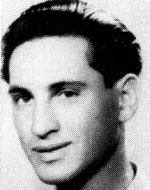Son of Bella and Eliezer. He was born on the 5th of Tishrei 5727 (October 5, 1927) in the Old City of Jerusalem as the son of his father, a well-to-do wealthy merchant of the Brisk of Lithuania, who studied for ten years in the “Etz Chaim” Talmud Torah. After his father’s death in 1941, he went to help support the family and he was thirteen years old, first working in a store in the city and then leaving Jerusalem and working as a salaried worker in Ramatayim and later on Kibbutz Negba and Givat Hashlosha. He volunteered for the study of sand, which he received from his brothers in Jerusalem, and in early 1944 he enlisted in the engineering corps of the British army, presenting a certificate he received from the Mukhtar of Petach Tikva, according to which he was twenty years old even though he was sixteen at the time. In the army, called the soldiers of the Irgun and assisted them in transporting weapons from the camps. On vacation days from his unit, he brought to Israel baskets full of eggs and vegetables under which were hidden British army notebooks for use by the underground. In July 1946, Meir was discharged from the army and became active in the Irgun, and on October 30, 1946, he participated with his friends in the bombing of the Jerusalem train station, in which he drove the fighters and explosives. His left hand was shattered, but he continued to drive until he reached the Yemin Moshe neighborhood, where the soldiers were dispersed, and the blood was taken to the hospital and the doctors had to cut off his arm to prevent blood poisoning. On March 25, 1947, the trial of Meir and his friends, who were also caught in action, opened in the Jerusalem military court. He himself did not defend himself and refused to recognize the authority of the tribunal to try him, and at the end of the proceedings he rose and delivered a speech against the British authorities: “… There is one answer in our conscience: We have survived not in order to live and expect the new Treblinka. We remained alive to ensure life, freedom and respect for ourselves, our people, our children and our children for generations to come. We stayed alive so that there would not be any more of what happened there and what might happen here under your rule … So here we have nothing to frighten. We have learned that there is a life worse than death, and there is a greater death than life. “He was sentenced to death in the Jerusalem prison and met Moshe Brazani, a Lehi man who was sentenced to death. The efforts of Meir’s family and the Yishuv leaders to replace the death sentence with imprisonment were unsuccessful and the sentence was set for the morning of 22.4.1947. And not a day before, he told his brother Benjamin and his friend Rachel that “the hangman’s rope will not come on my neck.” The two soon formed a plan to “die with the Philistines,” meaning to blow themselves up with explosives. Their colleagues in the prison stole two hand grenades wrapped in apple skins, but since they could not persuade Rabbi Goldman, who was supposed to come and get Viduim, to avoid being with them in their last moments, the two decided to blow themselves up at midnight. On May 22, 1947, before the hand of the executioner, they placed the grenades between their cores, embraced each other, Meir lit the wicks and thus removed their souls. .. “It is better to die with dignity than live in humiliation. I apologize to my mother and brother for the sorrow I caused and hope they will be proud of me. I ask the family: “Do not break your spirit!” The two were brought to eternal rest on the Mount of Olives in Jerusalem.Meir’s books were published among others in books and booklets: “Zachremam Netzach”, Yizkor book for the heroes of the Irgun Zvai Leumi; “The Book of Olei Ha’Gardom”, to Yosef Nadba, “The Victory of Ali Gerodom”, Lee. Gurion, in the novel “In One Collar”. Move and play “Pomegranate between Hearts” and. Amiel.
